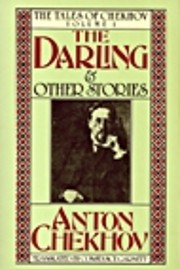

Pulse en una miniatura para ir a Google Books.
|
Cargando... The Darling and other stories [Tales of Tchehov vol. I]por Anton Chekhov
 Ninguno Actualmente no hay Conversaciones sobre este libro. sin reseñas | añadir una reseña
Pertenece a las series editorialesTales of Chekhov (01)
Anton Chekhov (1860-1904) was a master of the short story. The son of a former serf in southern Russia, he attended Moscow University to study medicine, writing short stories for periodicals in order to support his family. What began as a necessity became a legitimate career in 1886 when he was asked to write in St. Petersburg for the Novoye Vremya (New Times), owned by millionaire magnate Alexey Suvorin. Chekhov began paying more attention to his writing, revising and developing his own principles and conceptions of truth, for a time coming under the influence of Leo Tolstoy. As a result of his widespread popularity, Chekhov amassed a vast collection of short stories displaying an early use of stream-of-consciousness writing, as well as his powerful ideas concerning the individual, the tedium of life, and the beauty nature and humanity. This edition contains The Darling, Ariadne, Polinka, Anyuta, The Two Volodyas, The Trousseau, The Helpmate, Talent, An Artist's Story, and Three Years. No se han encontrado descripciones de biblioteca. |
Debates activosNingunoCubiertas populares
 Google Books — Cargando... Google Books — Cargando...GénerosSistema Decimal Melvil (DDC)891.73Literature Literature of other languages Literature of east Indo-European and Celtic languages Russian and East Slavic languages Russian fictionClasificación de la Biblioteca del CongresoValoraciónPromedio: (3.89) (3.89)
¿Eres tú?Conviértete en un Autor de LibraryThing. |
||||||||||||||||||||||||||||||||||||||||||||||||||||||||||||||||||||||||||||||||||||||||||||||||||||||||||||||||||||||||||
In any case, the definitive delivery of these stories is a sense of the people living in Russia in the late 1800s and we see all walks of life from the successful business man's son to the artist. Most of the people are living above the poverty line but the backgrounds are still quite diverse to be interesting.
Those expecting stories reminiscent of a dark and dreary Dostoevsky will be surprised. Chekhov's tales vary from the slice of life variety to the profound but they often have a sense of wit and intellectual mirth that makes them brighter stories. One can imagine Chekhov smiling in real life whereas one can only picture Dostoevsky gnashing his teeth. The stories are also very easy to read and understand, with the only major difficulty still being so many similar names and very different sounding nicknames attached to full formal names which make it slightly more challenging at times to follow the characters.
It's difficult to top the introduction from Richard Ford and how he explains Chekhov's writing. Here's a couple of quotes I liked from that:
"Indeed, one regularly finds humor in Chekhov, often in surprising though never really mistakable moments. As in Shakespeare as in Falkner as in Flannery O'Connor, the comic turn not only counterweighs and intensifies a serious story's gravity, it also humanizes our own fated intimacy with what's grave by permitting life's fullest, most actual context to be brought into view, even as it points us toward an approved method of acceptance: laughter."
"The entirety of Chekhov's stories, in fact, often seem-but for their formal, sturdy existence in language-not even artful (although that would be wrong) but rather to be assiduous in mapping out degree by precious degree an accurate ground level constellation of ordinary existence-each story representing a subtly distinguished movement in a single sustained gesture of life confirmed."
"With Chekhov, we share the frankness of life's inalienable thereness; we share the conviction of how much we would profit if more of human sensation cold be elevated into clear, expressive language; we share a view that life (particularly life with others) is a surface beneath which we must strive to construct a convincing subtext in order that more can be clung to less desperately..."
(